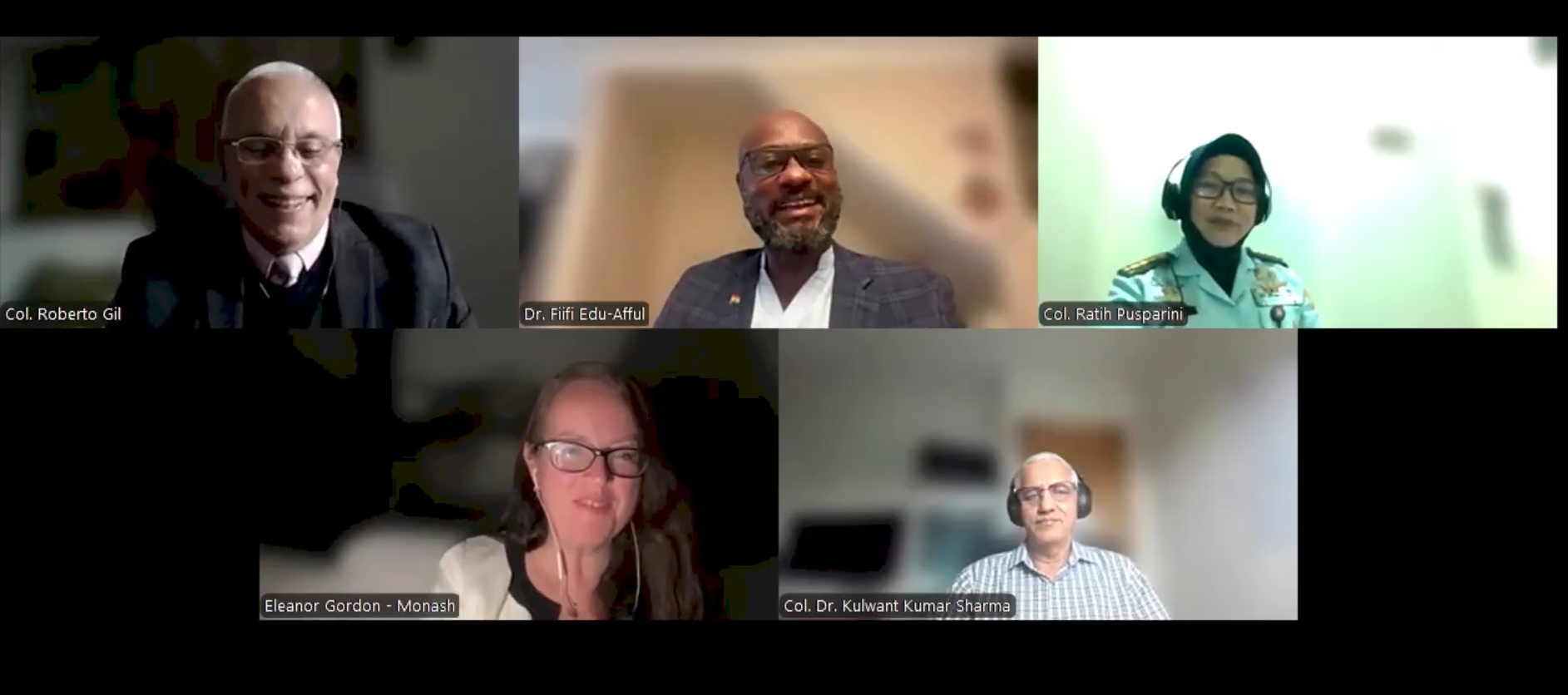RESDAL achieved a global audience at the webinar “The Future of the Women, Peace and Security Agenda: A Crisis or an Opportunity?”

On August 5, 2025, RESDAL and
Monash University’s Global Peace and Security research hub (Monash GPS)
co-hosted the webinar “The Future of the Women, Peace and Security Agenda: A
Crisis or an Opportunity?”, with the support of Global Affairs Canada
through the Elsie Initiative Fund.
RESDAL achieved a global
audience, bringing together 369 participants from 60 countries across eight
regions – Latin America and the Caribbean, Africa, Asia, MENA, Europe, North
America, and Oceania. Attendees included members of the armed forces and police
institutions, government entities, the judiciary, UN agencies, academia, and
civil society. This diverse
international and multisectoral composition turned the webinar into a dynamic
space for interregional dialogue and knowledge exchange.
Moderated by Dr. Eleanor Gordon, Director of Monash’s GPS Department, the
event was part of the series “Interregional Conversations from the Global
South”, a cycle led by RESDAL within the framework of the project Women
in Peace Operations: Supporting Inclusive Environments through Interregional
Collaboration and National Engagement.
Organized and driven by RESDAL since 2025, this cycle has strengthened
South–South and South–North cooperation and demonstrated the importance of
sustaining spaces for dialogue and exchange on the Women, Peace and Security
Agenda. Panelists highlighted that the Elsie Initiative has been a genuine
factor of change and transformation in their countries, creating more inclusive
and sustainable conditions for women’s participation in peace operations.
The panel brought together Col. (Dr.) Kulwant Kumar Sharma, Visiting Fellow
at the United Service Institution of India; Col. Ratih Pusparini, Head of
International Cooperation at the National Resilience Institute of the Republic
of Indonesia; Col. (rtd.) Roberto Gil, Presidential Advisor of the IAPTC; and
Dr. Fiifi Edu-Afful, Senior Researcher at PACAV–UNIDIR. Together, they ensured
a balanced, interregional discussion that combined perspectives from the
military, academia, and policy sectors.
The exchange revolved around the extent to which the Women, Peace and
Security Agenda has been integrated into defense and security institutions, the
different approaches, achievements, and challenges emerging in the Global
South, as well as the impact of setbacks in parts of the Global North.
Participants debated whether this represents a crisis or, rather, an
opportunity for renewed and more robust engagement. They also reflected on the
future of the agenda and the steps needed to move beyond rhetoric toward real
and meaningful transformation.
The debate showed that while in some Global North contexts the Women, Peace
and Security Agenda faces criticism and reduced visibility, in many Global
South countries it is gaining stronger national ownership. Challenges persist,
however, including perceptions of the agenda as externally imposed, uneven
military engagement, and dependence on international funding.
The discussion underlined that women’s roles in peace and security must
move beyond the symbolic and become embedded in decision-making, leadership,
and institutional practices. Quotas were highlighted as a pragmatic mechanism
to accelerate participation and normalize women’s leadership, while
context-specific approaches grounded in local realities were seen as essential
to ensuring legitimacy and sustainability.
Examples from Indonesia, India, Uruguay, and Ghana reflected both progress
and limitations. Advances in recruitment, training, and gender mainstreaming
are taking place, though unevenly. The support of high-level male allies was
identified as crucial to open doors, while women’s agency, preparedness, and
leadership remain central to advancing the agenda.
The key message of consensus was that the Women, Peace and Security Agenda
is not in decline but stands at a crossroads. Its future will depend on
sustained political will, military engagement, and civil society activism. As
one participant noted: “The Global South is taking the lead in advancing the
Women, Peace and Security Agenda. The key now is sustaining that engagement.”
Global participation
Latin
America and the Caribbean (14 countries): Argentina, Brazil, Chile,
Colombia, Costa Rica, Dominican Republic, El Salvador, Guatemala,
Honduras, Mexico, Paraguay, Peru, Uruguay, Venezuela.
Africa (20 countries): Benin, Burkina Faso,
Burundi, Cameroon, Central African Republic, Côte d’Ivoire, Democratic
Republic of Congo, Ghana, Guinea, Kenya, Mali, Niger, Nigeria, Rwanda,
Senegal, Sierra Leone, South Africa, Togo, Uganda, Zimbabwe.
Asia (9 countries): Bangladesh, India, Indonesia,
Nepal, Pakistan, Philippines, Sri Lanka, Thailand, Timor-Leste.
MENA (6 countries): Algeria, Egypt, Jordan,
Lebanon, Morocco, Tunisia.
Europe (6 countries): France, Germany, Italy,
Spain, Sweden, United Kingdom.
North America (2 countries): Canada, United
States.
Oceania (2 countries): Australia, New Zealand.



